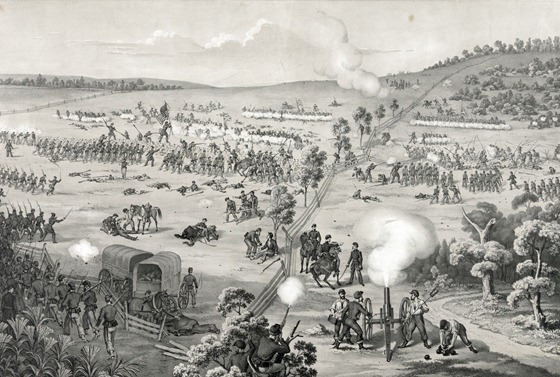September 14. — The entire National army moved from Frederick, Md., at daylight this morning, taking the route towards Harper’s Ferry.—Ripley, Va., was occupied by the advance of Col. Lightburn’s troops.
—This evening the stockade fort at Bacon Creek, Ky., was surrendered to the rebel cavalry under Colonel J. J. Morrison. The garrison consisted of Sergeant Ellis and twenty-eight men of company D, Fifty-fourth regiment of Indiana home guards. The regiment had been posted at different points along the railroad, and this squad at Bacon Creek. This afternoon, about dark, Col. Morrison made his appearance, and, while sending in a flag of truce, planted his artillery so as to destroy the fort He demanded its surrender, threatening, in case of his refusal, to open upon it with his artillery. Sergeant Ellis consulted with the rebel officer, and represented their position to Morrison. It was agreed that the party should be paroled, not to take up arms until regularly exchanged or discharged from the service. The men then surrendered. Morrison destroyed the fort and took about fifty guns.
—Maysville, Ky., was evacuated by the rebels and taken possession of by the National forces under Colonel Norton of the Twenty-first Ohio volunteers.
—General Butler, at New-Orleans, La., issued the following general order: “As in the course of ten days it may become necessary to distinguish the disloyal from the loyal citizens and honest neutral foreigners residing in this Department,
“It is ordered that each neutral foreigner, resident in this Department, shall present himself, with the evidence of his nationality, to the nearest Provost-Marshal for registration of himself and family.
“This registration shall include the following particulars:
“The country of birth. The length of time the person has resided within the United States. The names of his family. The present place of residence, by street, number, or other description. The occupation. The date of protection or certificate of nationality, which shall be indorsed by the Passport Clerk, ‘registered,’ with date of register;
“All false or simulated claims of foreign alliance by native or naturalized citizens will be severely punished.”
—General Loring, the rebel commander at Charleston, Va., issued the following order this day: “The Commanding General congratulates the army on the brilliant march from the Southwest to this place in one week, and on its successive victories over the enemy at Fayette Court-House, Cotton Hill, and Charleston. It will be memorable in history that, overcoming the mountains and the enemy in one week, you have established the laws and carried the flag of the country to the outer borders of the Confederacy. Instances of gallantry and patriotic devotion are too numerous to be specially designated at this time; but to brigade commanders and their officers and men, the Commanding General makes grateful acknowledgment for services to which our brilliant success is owing. The country will remember and reward you.”
—Drafting in the State of Ohio was postponed until the first day of October, by order of Governor Tod.—The First Metropolitan regiment, N.Y.S.V., left Riker’s Island for Washington.
—The battle of South-Mountain, Md., was fought this day, between the rebel army invading Maryland, under General Lee, and the National forces, commanded by Generals Hooker and Reno, resulting in the defeat of the rebels, who, after stubbornly contending the whole day, abandoned the field of battle at night, leaving their dead and wounded in the hands of the Nationals. The loss of the rebels was not known, although it was acknowledged to be greater than that of the Nationals, which amounted to over two thousand killed, wounded, and missing. Gen. Reno was among the killed.—(Doc. 119.)
—The attack upon Harper’s Ferry, Md., was continued by the rebels this morning in a vigorous cannonading from Maryland and Loudon Heights, and from Sandy Hook; the Union troops under Gen. Miles replying frequently.
—The funeral of Col. George W. Pratt, of the New-York Twentieth regiment, took place at Albany to-day. It was one of the largest assemblages ever seen in that city on a similar occasion. It was attended by the Governor and staff, the Tenth and Twenty-fifth regiments, deputations from Masonic orders, and a number of distinguished strangers from New-York and elsewhere.
—An engagement took place at Munfordsville, Ky., between a force of Union troops stationed in that town, under the command of Col. Wilder, Seventeenth Indiana, and a large body of rebels, under General Duncan, resulting, after a fight of seven hours’ duration, in the repulse of the rebels with great loss.—(Docs. 121 and 207.)
—This evening the Union cavalry at Harper’s Ferry, two thousand in number, succeeded in cutting their way out by the Sharpsburgh road, and while so doing captured one hundred prisoners, and the rebel General Longstreet’s wagon train.—(Doc. 120.)




